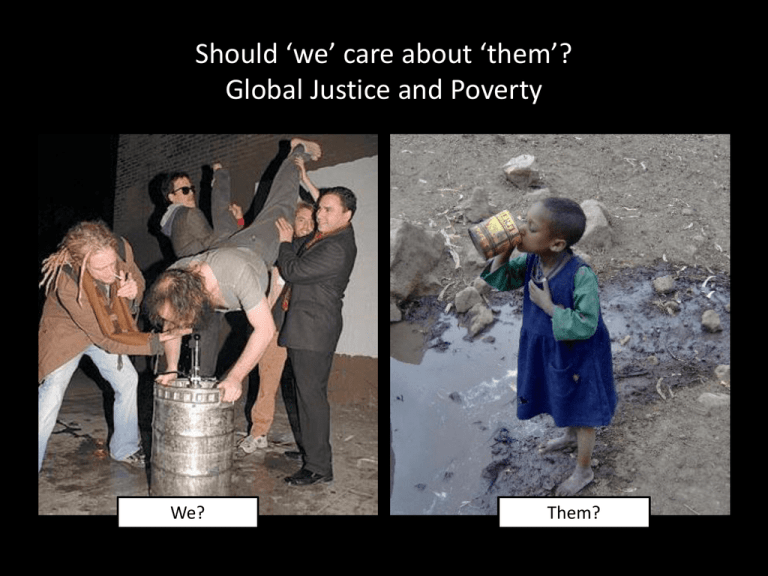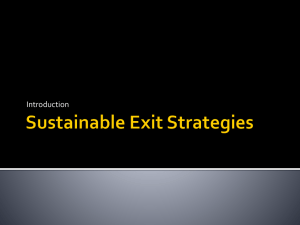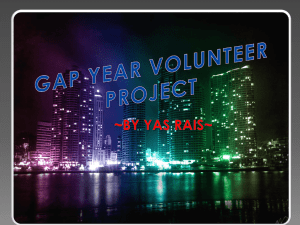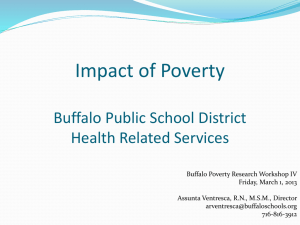Document
advertisement

Should ‘we’ care about ‘them’? Global Justice and Poverty We? Them? We Them Wealth Distribution 2013 We / Them Limpopo Refugee Camp Them Basic Facts about Poverty • Nearly half of the world’s population — more than 3 billion people — live on less than $2.50 a day. More than 1.3 billion live in extreme poverty (less than $1.25 a day). • The gap between rich and poor grows and is larger now than it has ever been in recorded history. • More than 1 billion people lack adequate access to clean drinking water and an estimated 400 million of these are children. Because unclean water yields illness, roughly 443 million school days are missed every year • In 2011, 165 million children under the age 5 were stunted (reduced rate of growth and development) due to chronic malnutrition. • 870 million people worldwide do not have enough food to eat. • Preventable diseases like diarrhea and pneumonia take the lives of 2 million children a year who are too poor to afford proper treatment. • 80 percent of the world population lives on less than $10 a day. • Poverty and Disease: – AIDS – 30 million dead. – 2 billion infected with Tuberculosis. 9.2 million new cases per year. – 1 million deaths from Malaria a year. • It would cost approximately $40 billion to offer basic education, clean water and sanitation, reproductive health for women, and basic health and nutrition to every person in every developing country. Global Justice • The idea that we have duties of justice to all human beings based solely on their humanity alone, without reference to nationality, citizenship, ethnicity, race, religion, gender or other particularities. • If justice is defined as ‘just treatment and the quality of being fair and equitable……’ • Then global justice refers to just treatment of all humans and the quality of being fair and equitable to those beyond our borders. But, Relax ‘we’ Really Don’t Have to Care Too Much • • • • • Justice requires a sense of national solidarity and cultural identification. Justice is only about institutional structures, if they don’t exist, justice does not exist. Justice is about reciprocal relationships where expectations are generated. Justice only applies where ‘relational conditions’ exist, if this is not the case at the global level, justice remains an internal matter for states. Duties for some assistance, but not justice. Why ‘We’ Have to Care • It is a matter of happenstance where a person is born. Determining just treatment on the accident of birth is arbitrary and unfair. • There are global institutions that greatly alter the lives of those beyond our borders. • Globalization creates ‘relational conditions’ that demand social cooperation and culpability, where the scope of justice applies. Drivers of Poverty • • • • • • • Profit shifting by large Int’l corporations Capital flight Large national debt loads Unequal market access or conditionalities Large scale corruption Disease burdens General lack of political will Preventing Known Harm Even if you don’t buy the positive moral argument…. • Negative argument – would you knowingly want to harm another human being? • According to the United Nations Food and Agriculture Organization there is enough food produced to adequately feed the world population. • The largest driver of poverty is unfair economic and political structures that perpetuate inequities. • Western lifestyles are paid for from the poverty of others. • Is 40 billion really too much? Questions • Do ‘we’ in the developed world have an obligation to eliminate global poverty? • If not, why not? If so, why? And what would those obligations look like? • What prevents us from preventing global poverty? • Is it worth the $40 billion cost?











